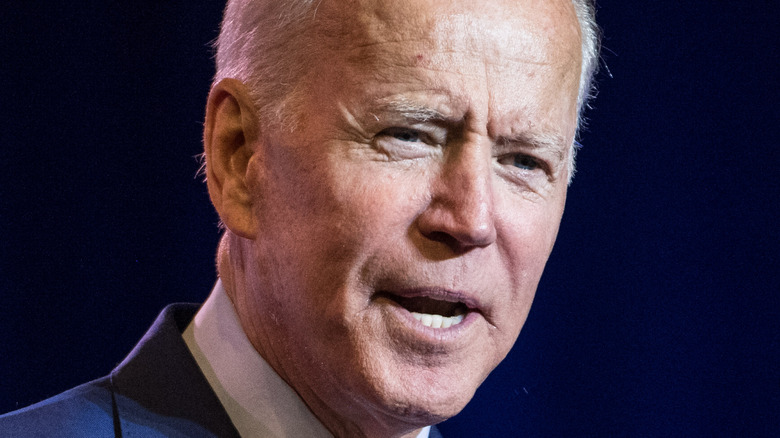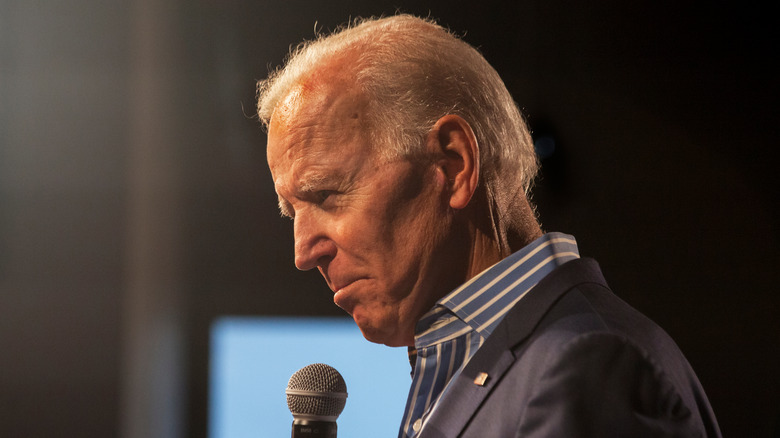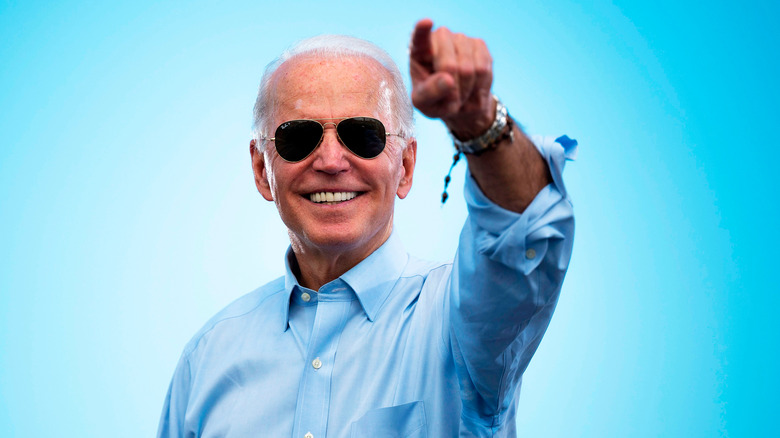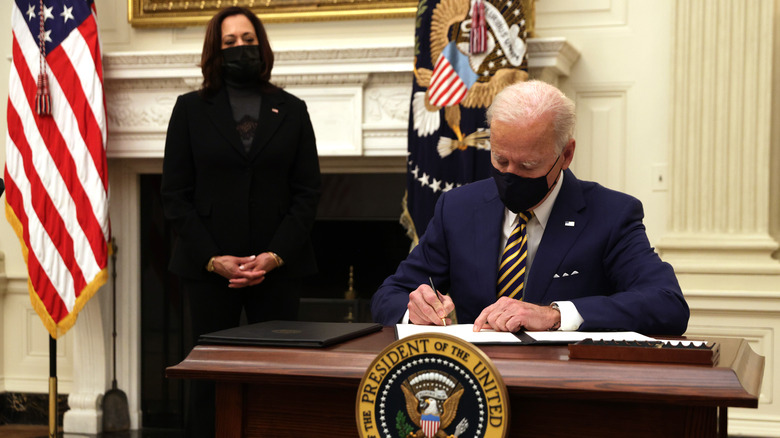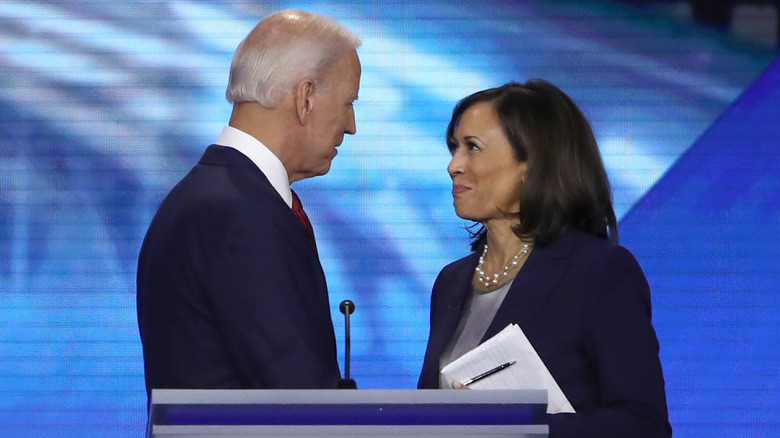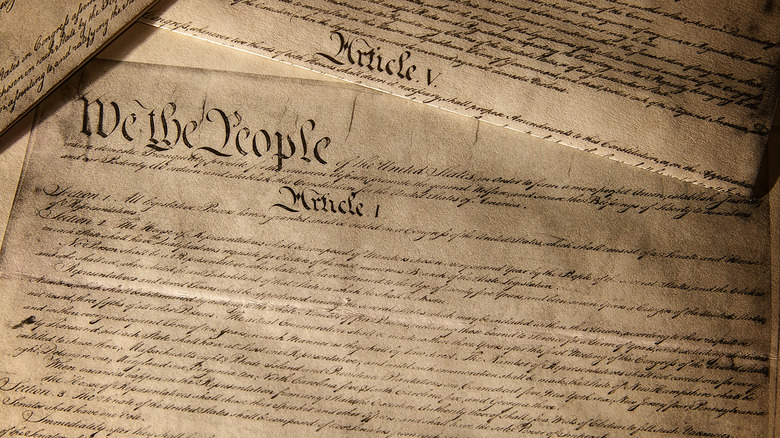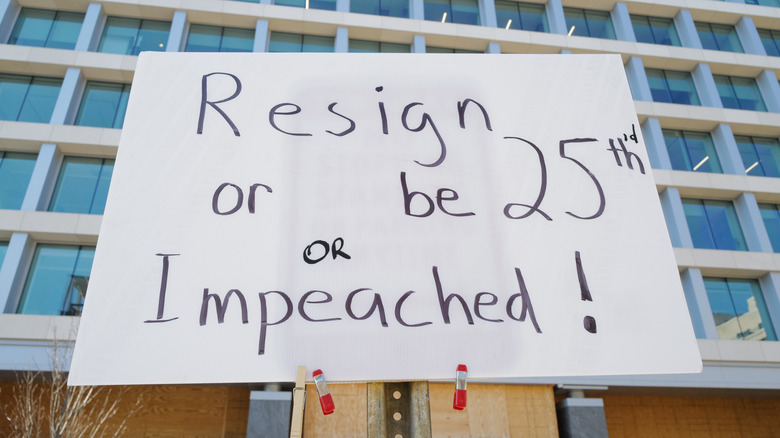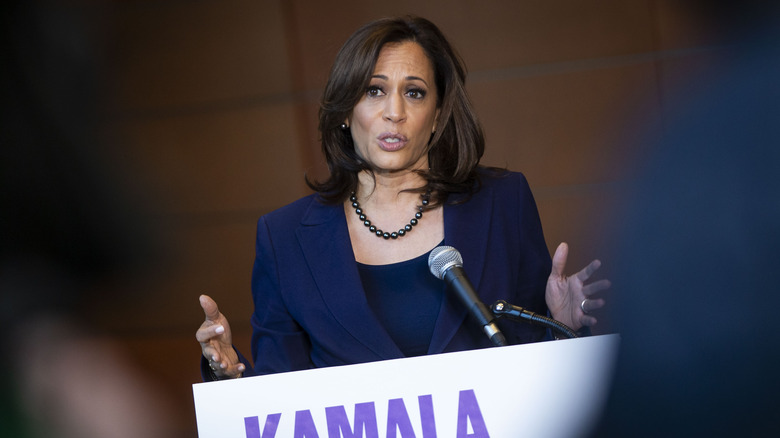What Happens If Joe Biden Dies While He's In Office?
Don't worry! President Joe Biden is perfectly fine, according to a doctor statement he released in December 2019, during his campaign. The Democrat is a "healthy, vigorous, 77-year-old male, who is fit to successfully execute the duties of the Presidency to include those as Chief Executive, Head of State and Commander in Chief," read the three-page report signed by George Washington University's physician Kevin O'Connor, as NBC News reported at the time. Biden has since turned 78, a milestone he celebrated on November 20, 2020.
Before taking his oath, Biden received both doses of the Pfizer/BioNTech vaccine to protect him against the COVID-19 virus — the first in December and the second on January 11, 2021, per ABC7News.
But Biden is still the oldest person to ever move into the White House, as the Associated Press noted. Ronald Reagan was 16 days away from turning 78 when he left office in 1989 after serving two terms as the 40th U.S. president, making Biden older at the onset of his first term than the previous oldest president was at the end of his second, the AP detailed. This has raised concerns among citizens that his health could deteriorate in the four years he will be in office
While there is no reason to assume the worst, there is comfort in knowing that a well-established mechanism is in place to handle that situation. Keep scrolling to find out what happens if Biden dies while in office and to learn more about the history behind it.
Joe Biden has suffered a series of health setbacks
As NBC News has noted, President Joe Biden's medical history isn't perfect. In 1988, when he was serving as a U.S senator for Delaware, Biden suffered two aneurysms at age 45, undergoing two separate corrective surgeries in February and May, respectively, as The New York Times reported at the time. The first aneurysm was bigger and affected an artery on the left side of his brain while the second was smaller and located on the opposite side, the report detailed.
In March, a month after undergoing emergency surgery to correct the first aneurysm, Biden was hospitalized with symptoms of pulmonary embolism, according to The Washington Post. The blood clot was likely a side effect of the February procedure as it is a complication commonly associated with such surgeries, the Post explained.
Per NBC News, Biden has experienced no long-term effects of his aneurysms, though he is still on blood thinners — medication that prevents blood clots from developing. Other than that, he only takes "medication for acid reflux, cholesterol and seasonal allergies," according to NCB's correspondent Dr. John Torres. In Dr. Kevin O'Connor's 2019 report (via NBC News), he noted that Biden drinks no alcohol, uses no tobacco products, and exercises regularly.
Other procedures Biden has undergone include removal of his gallbladder and a few non-melanoma skin cancers, per the report. In 2009, Biden was treated for atrial fibrillation, but O'Connor noted in his report that he no longer experiences symptoms.
There is a 79.2% chance Joe Biden will survive his first term as president
Even though Joe Biden is the oldest person to take the oath as president of the United States, he has a good chance of seeing it through to the end. According to a pre-2020 election academic paper by the American Federation for Aging Research, the president has a 79.2% chance of surviving until 2024, concluding that "chronological age should not be a relevant factor in the forthcoming elections."
Amid concerns raised about his health during the campaign, Biden assured citizens that he wouldn't run a second time if he experienced any decline in "mental or physical health," the Associated Press reported in May 2020. He also described himself as a "transition candidate" who would set the stage for younger Democrats, per the AP. Biden has since stated his "expectation" to run for re-election.
But even in 2024, Biden's age still shouldn't concern voters, per AFAR. Research results showed Biden has a 70% chance of making it through the end of a second four-year term at the age of 85. Regardless of future elections, Biden is set to make history as the only president older than 80 to complete a first term in office, per AFAR. "An older person who has an active lifestyle and is consistently being challenged cognitively can fulfill [presidential] duties," said Dr. Richard Dupee (via WebMD). But even if tragedy strikes, the Constitution can handle it, though it has had ups and downs.
Kamala Harris would replace Joe Biden if the president dies
Vice President Kamala Harris would be sworn in as the 47th president of the United States if President Joe Biden died before he could complete his four-year term, as established by the 25th Amendment, adopted in 1967.
A post that went viral some months before the 2020 election stated that, if Biden died in office, Harris would replace him as president and Speaker of the House of Representatives Nancy Pelosi would become her vice president. While the post got the first part right, the second is incorrect. As PolitiFact explained, the speaker of the House doesn't automatically fill the vacated position. In this case, Harris would nominate a vice president of her choice, who would have to be approved by both houses of Congress.
While the social media post seemed to be trying to make a political point, the fact that the poster was confused about who would replace the vice president is understandable. As the United States Senate website explained, the role of the vice president wasn't seen as incredibly important for much of U.S. history, and so figuring out how to fill it in case of tragedy wasn't exactly a top priority for the framers of the Constitution. And thus, until the mid-20th century, "[t]he framers' failure to provide a method for filling a vice-presidential vacancy continued to plague the nation," as the website put it. The 25th Amendment corrected this shortcoming by providing specific details about the process.
What happens if Kamala Harris and Joe Biden both died?
If President Joe Biden and Vice President Kamala Harris died at the same, say during a terrorist attack, then Speaker of the House of Representatives Nancy Pelosi, would become acting president. The speaker of the House would step in only if both the president and the vice president "become simultaneously unable to serve," as USA Today explained. Though Pelosi would act as president, she wouldn't become president like the vice president would, per the Presidential Succession Act of 1947, signed by President Harry S. Truman. But this has never happened, so issues relating to it could still arise, as Quartz explained.
If Biden died and Harris became president, she would choose a vice president who would replace her if she became unable to serve, as dictated by the 25th Amendment. That is how Gerald Ford became president in 1974. Before replacing President Richard Nixon following his resignation amid Watergate, Ford, then House minority leader, was nominated by Nixon to replace Spiro Agnew as vice president in 1973, when the latter stepped down following accusations of tax evasion, bribery and extortion, as Britannica detailed.
Prior to the ratification of the 25th Amendment, Nixon's temporary replacement would have been then-Speaker of the House, Carl Albert. And so, Ford, via the 25th Amendment, became the only person in the United States to have served as vice president and president without being elected by the people, according to the National Constitution Center.
The U.S. Constitution established that the vice president was next in line of succession
The line of succession from president to vice president is as old as the U.S. Constitution itself. Article II, Section 1, Clause 6 stated that "in Case of the Removal of the President from Office, or of his Death, Resignation, or Inability to discharge the Powers and Duties of the said Office, the Same shall devolve on the Vice President." However, the article offers little regarding what would "devolve" to the vice president, as explained by the Legal Information Institute. Is it the presidency itself, with its title and everything else that comes with it, or just the duties on an acting president basis?
The article also didn't delve into who would fill the position of vice president in case he or she should vacate it to replace the president. Until the 1960s, when the 25th Amendment was adopted, the U.S. lived through the resignation of one and the death of seven VPs. Eight others replaced presidents. In 20% of those cases, the office was left "unoccupied," per the National Constitution Center.
The Constitution also failed to address who should step in if presidents became temporarily unable to serve due to illness or disability. This was an issue in several occasions. Examples include the July 1881 assassination attempt of James A. Garfield that left him incapacitated before he died, and Woodrow Wilson's October 1919 stroke, which debilitated him severely, per law professor John D. Feerick.
The 25th Amendment clarified questions regarding presidential succession in 1967
Led by Sen. Birch Bayh, Congress submitted the 25th Amendment to the Constitution in 1965 as an effort to clarify the questions surrounding presidential succession. The amendment was adopted in 1967 when Nevada became the 38th state to ratify it — the minimum number of states required, though nine other states followed suit in the following months, as stated on the U.S. Constitution website.
The first section of the 25th Amendment established that the vice president would indeed become president following the resignation, removal, or death of a sitting president, as The New York Times explained. The second section determined that the position of the vice president would be filled by a presidential appointment, pending Congress approval. This clarification became useful in 1974, when President Richard Nixon resigned during the Watergate scandal. When his vice president, Gerald Ford, was sworn in, he nominated Nelson Rockefeller as his VP with no confusion involved, as USA Today explained.
The amendment also allows the vice president to step in as acting president in case the latter becomes temporarily unable to serve. Finally, the 25th Amendment gives the vice president and the cabinet power to remove the president if they believe he or she is "unable to discharge the powers and duties of his office." That was what Democratic senators were asking former Vice President Mike Pence to use against former President Donald Trump after the January 6, 2021, attacks on Capitol Hill, per the BBC.
Kamala Harris could end up serving more than eight years as president
The 25th Amendment leaves no room for doubt that Vice President Kamala Harris would replace Joe Biden as president if he died while in office. But would she be able to run for president later on if she were to step in for Biden? Yes. In fact, she could end up as a candidate in 2024 and 2028, but that would depend on when the president died.
If Biden became unable to serve within his first two years in office, Harris could run for one additional term as president, per the The North State Journal. If he died within the last two years, his vice president could then run in two elections, meaning Harris could end up being president for more than eight years if Biden died either in 2023 or 2024 — and if she were successful, of course.
That is because the 22nd Amendment to the Constitution, adopted in 1951 under Harry S. Truman, established that no president could hold office for more than two terms, per the National Constitution Center, which wasn't laid out in the Constitution. The amendment also clarified that "no person who has held the office of President, or acted as President, for more than two years of a term to which some other person was elected President shall be elected to the office of President more than once." Prior to it, presidents served two terms because that's what George Washington did, per Britannica.

